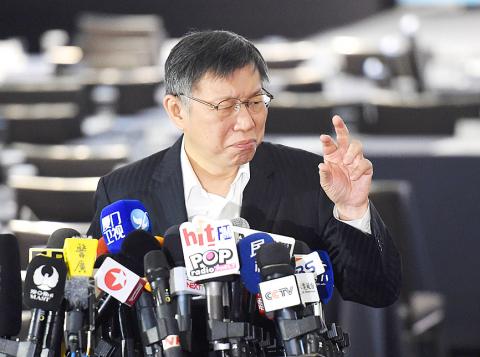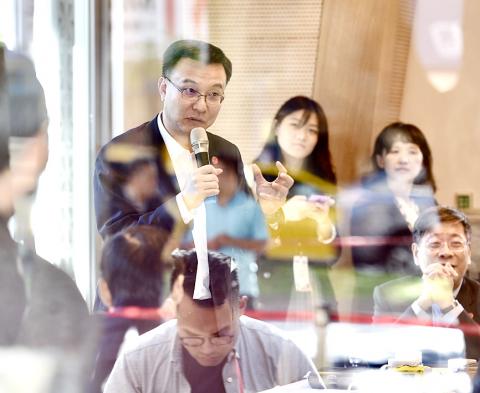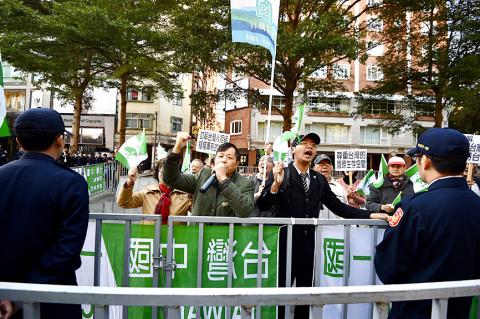Shanghai Vice Mayor Zhou Bo (周波) expressed his willingness to forge cooperation with more cities and counties in Taiwan — provided that they have an “accurate perception” of the nature of cross-strait relations — as he touted the achievements of the annual Taipei-Shanghai Forum that opened in Taipei yesterday morning.
This year’s forum was themed “sustainable cities, sustainable development,” with a special focus on a circular economy. Other topics discussed at the event included public housing; urban renewal; healthcare; movie and fashion culture; and waste disposal and repurposing.
“As long as they have an accurate perception about cross-strait ties and exchanges, we are willing to begin cooperation with more of Taiwan’s cities and counties,” Zhou said when asked why China has been willing to interact with Taipei Mayor Ko Wen-je (柯文哲), even though he has only endorsed the idea that “both sides of the [Taiwan] Strait are one family” and not the so-called “1992 consensus.”

Photo: Huang Yao-cheng, Taipei Times
Ko has had a clear and consistent perception of cross-strait relations, which Zhou said is “highly conducive” to enhancing cooperation and exchanges across the Taiwan Strait.”
“We believe adherence to the idea of ‘both sides of the Strait are one family’ will allow cooperation between Shanghai and Taipei to be further expanded,” he said.
Zhou made the remarks at a news conference after the opening ceremony of the forum, which was held at the Regent Taipei hotel and was attended by 135 representatives from Shanghai and 250 representatives from Taipei.

Photo: Peter Lo, Taipei Times
The “1992 consensus” refers to a tacit understanding between the Chinese Nationalist Party (KMT) and the Chinese Communist Party that both sides acknowledge there is “one China,” with each side having its own interpretation of what “China” means.
Former Mainland Affairs Council minister Su Chi (蘇起) in 2006 admitted to making up the term in 2000.
China’s Taiwan Affairs Office has made acknowledgement of the “1992 consensus” a prerequisite for cross-strait exchanges, but some politicians, including Ko, have chosen to meet Beijing’s demand halfway by supporting the “one family” idea.

Photo: Peter Lo, Taipei Times
Zhou also embraced the idea of expanding the forum, now in its ninth year, to include Kaohsiung, but said how a three-city forum could work is an issue that needs to be discussed by all concerned parties.
There has been speculation that closer exchanges would be seen between Kaohsiung and Chinese cities after Kaohsiung mayor-elect Han Kuo-yu (韓國瑜) — who is to be the city’s first KMT mayor in 20 years and who has publicly endorsed the “1992 consensus” — takes office on Tuesday.
At his news conference, Ko defended his decision to use “both sides of the Strait are one family” again at a dinner the Taipei City Government threw for Zhou’s delegation on Wednesday, despite previously lamenting the “stigmatization” of the phrase, as well as the term “1992 consensus.”
"I used that phrase in 2015 and last year. Like I said at the very beginning, we should avoid throwing a wild card and should just stick to old practices,” Ko said, adding that his approach is to find an option acceptable to most people, as it is impossible to find one that satisfies everyone in a democracy.
However, Ko, who was re-elected in the Nov. 24 nine-in-one elections, revealed that he has suggested to Beijing that efforts should be made to develop a new term that both sides find tolerable to replace the “1992 consensus” and the “one family” idea.
Given that both terms have been given a political label, neither can now be used without upsetting some people, he said.
At the event’s main session, Zhou said that Shanghai has benefited tremendously from the annual forum and has put into practice the lessons it learned from Taipei, including the establishment of a service hotline for residents.
Taipei Deputy Mayor Teng Chia-chi (鄧家基) said he hopes that the forum can help overcome the differences between the two cities and pave the way for the peaceful development of cross-strait relations.
“What we have observed since last month’s elections is that the pan-blue, pan-green and pan-white camps have all agreed on the importance of expanded interactions. Hopefully, Taipei’s and Shanghai’s positive interactions could be a catalyst for more comprehensive exchanges across the Taiwan Strait,” he said.
Three memorandums of understanding were inked at the forum: one for the cultivation of young athletes in Taipei and Shanghai; one for exchanges between Taipei’s Datong District (大同) and Shanghai’s Jiading District; and one for cooperation between the Taipei Film Commission and the Shanghai Broadcasting Film and Television Producers Association.

AGING: As of last month, people aged 65 or older accounted for 20.06 percent of the total population and the number of couples who got married fell by 18,685 from 2024 Taiwan has surpassed South Korea as the country least willing to have children, with an annual crude birthrate of 4.62 per 1,000 people, Ministry of the Interior data showed yesterday. The nation was previously ranked the second-lowest country in terms of total fertility rate, or the average number of children a woman has in her lifetime. However, South Korea’s fertility rate began to recover from 2023, with total fertility rate rising from 0.72 and estimated to reach 0.82 to 0.85 by last year, and the crude birthrate projected at 6.7 per 1,000 people. Japan’s crude birthrate was projected to fall below six,

US President Donald Trump in an interview with the New York Times published on Thursday said that “it’s up to” Chinese President Xi Jinping (習近平) what China does on Taiwan, but that he would be “very unhappy” with a change in the “status quo.” “He [Xi] considers it to be a part of China, and that’s up to him what he’s going to be doing, but I’ve expressed to him that I would be very unhappy if he did that, and I don’t think he’ll do that. I hope he doesn’t do that,” Trump said. Trump made the comments in the context

SELF-DEFENSE: Tokyo has accelerated its spending goal and its defense minister said the nation needs to discuss whether it should develop nuclear-powered submarines China is ramping up objections to what it sees as Japan’s desire to acquire nuclear weapons, despite Tokyo’s longstanding renunciation of such arms, deepening another fissure in the two neighbors’ increasingly tense ties. In what appears to be a concerted effort, China’s foreign and defense ministries issued statements on Thursday condemning alleged remilitarism efforts by Tokyo. The remarks came as two of the country’s top think tanks jointly issued a 29-page report framing actions by “right-wing forces” in Japan as posing a “serious threat” to world peace. While that report did not define “right-wing forces,” the Chinese Ministry of Foreign Affairs was

PREPAREDNESS: Given the difficulty of importing ammunition during wartime, the Ministry of National Defense said it would prioritize ‘coproduction’ partnerships A newly formed unit of the Marine Corps tasked with land-based security operations has recently replaced its aging, domestically produced rifles with more advanced, US-made M4A1 rifles, a source said yesterday. The unnamed source familiar with the matter said the First Security Battalion of the Marine Corps’ Air Defense and Base Guard Group has replaced its older T65K2 rifles, which have been in service since the late 1980s, with the newly received M4A1s. The source did not say exactly when the upgrade took place or how many M4A1s were issued to the battalion. The confirmation came after Chinese-language media reported